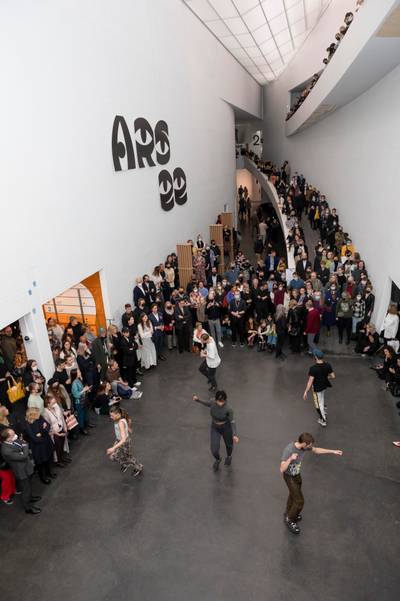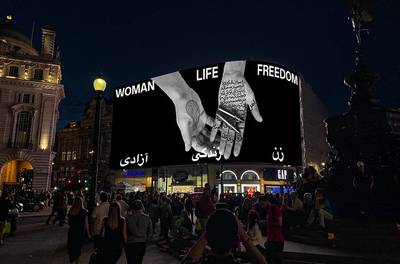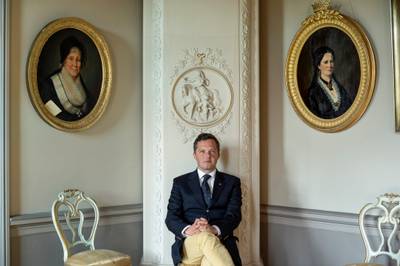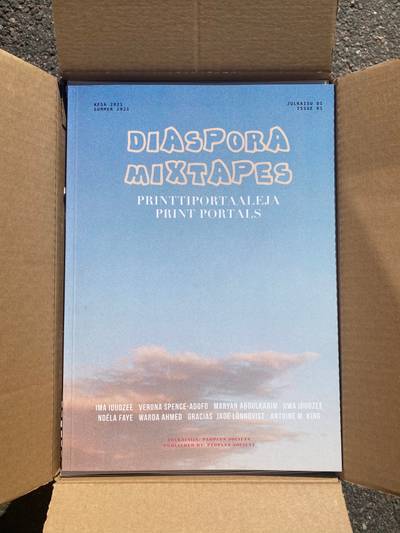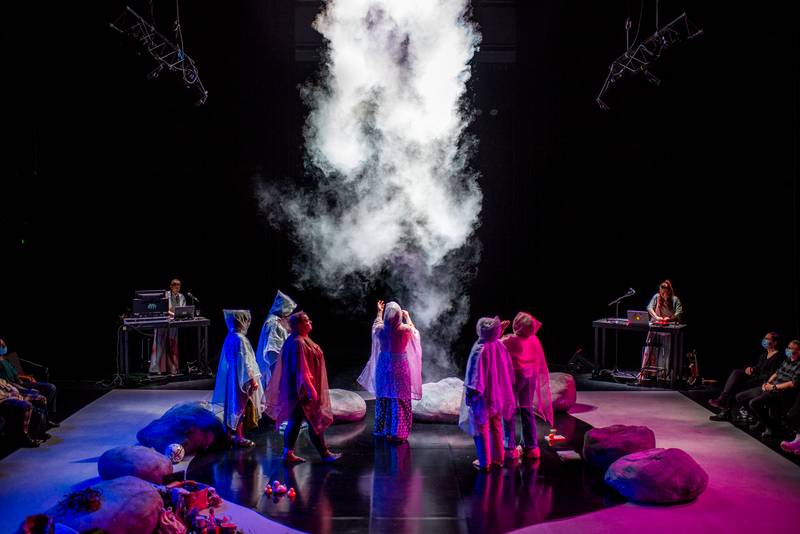

Asta, Eugenie, Heli, Lintu, Sari and Stella on stage
Vishnu Vardhani RAJAN is a Body-Philosopher. A hyphenated identity, multidisciplinary practices, building connections between art, science, witchcraft, history and cultures define their practice. Vishnu explores shame, through dance, acting and stand-up comedy. Oscillating between cultures, methodologies and sexual identities, each different from the other are instrumental in their visual Language.
Ejaculation Falls | Directed by Essi Rossi and Working Group | Duration: 2h 30m | Language: Finnish English
Ejaculation Falls was a long, meandering performance brimming with emotions. I’d like to apply that dramaturgy to this text as well. While the performers were interviewing each other at their ‘picnic’, I was responding to those questions for myself too. The performers were named Asta, Eugenie, Heli, Lintu, Sari and Stella. I was listening, vibing, and having a parallel silent conversation in my head. Because of this multidirectional conversation, when I first heard the question, “What brought you here today?” I laughed out loud, as I thought to myself, Well, this performance pardis!
After the initial feeling of klutzing1 enjoyed that question every time it was posed – a nice way to create a moment of fiction in reality and fold reality into this space of ‘performativity’. “What brought you here today?” set the tone for the range of topics that followed in the performance, which included some fiction, a bit of performativity, and some possible realities: gender, sexuality, and sexual reciprocity. I was able to comfortably drift in and out of my head space because the performance was in both Finnish and English. When in our brief history of heterosexuality, did we begin to focus on the agent, rather than the act?
“So when did we stop being queer?” I thought for the first time during the performance.
I put these personal arguments to hold, to attend Eugenie’s interview, one of the characters in the performance.

When asked, “What’s your fantasy?” Eugenie replied that it is more of a dream than a fantasy, “Free Palestine.”
I felt a pang, a connection of agony, when Eugenie shared about their birthday evening and the general yucky behaviour they regularly endure, solely because of their hypervisibility as a hypersexualised West Asian body. Jane Ward, author of Not gay: Sex Between Straight White Men, asks: “What would it mean to think about people’s capacity to cultivate their own sexual desires, in the same way we may cultivate a taste for food?” I bring this question to your focus, to understand how bipoc2 people cultivate their sexual desires in very white scapes?
When asked, “What’s your fantasy?” Eugenie replied that it is more of a dream than a fantasy, “Free Palestine.” The group posed another question, “How does desire live and change?” Knowing we human beings are an integrated anima corpus et spiritus3, and as social relational beings, is it possible to suspend our daily dismay, like we suspend our disbelief when listening to fantasy tales, to set aside socio-politics of war and other systemic oppressions and fiercely engage in pleasure and desire? Eugenie’s response to me is a testament to the interconnectedness of personal and political, and how politics can mess with people. “Some things come with their own punishments. Like bedrooms with built-in cupboards. We would all learn more about punishments soon. That they came in different sizes. That some were so big they were like cupboards with built-in bedrooms. You could spend your whole life in them, wandering through dark shelving”4 says Arundhati Roy in The God of Small Things (1997). It’s also a question of where all pleasure can be found? I say, for some folk, dreams, desires, fantasies dance alongside the monsters under the bed, the skeletons in the cupboards in the bedroom. Vaatsyaayana’s Kamasutra – a (complicated and undecipherable, without the images) beginners guide to love, sex and acrobatics5 suggests that small everyday pleasure practises like sipping water, being sun kissed (or sunlamp kissed) eating gooseberries, can improve our engagement with life and living. A bit like in the movie Taste of Cherry by Abbas Kiarostami.
Paule Marshall, an influential American Black female novelist from the 1950s, whose novels about ethnic identity, race and colonialism shed light on the lifetime of many bipoc immigrants, came constantly to my mind during this performance. Especially her words “Sometimes a person has to go back, really back-to have a sense, an understanding of all that’s gone to make them-before they can go forward”, made me think of going back in human history. The two hours of Ejaculation Falls helped me journey backwards. I was reminded of the Khajuraho6 temples built between 950 AD and 1050 AD, and a few of those temples have carvings of sculptures that depict, explicit sexual postures between all genders.
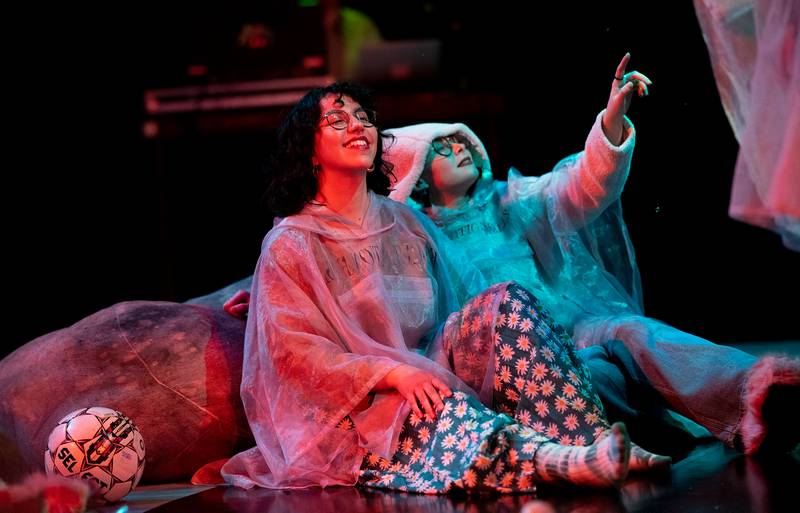

At one of the picnics enacted throughout the performance
So when did we stop being gender plural?

All I’m saying is, I want equity, I also want space; I want to use technology for my neuro-hacking and biohacking to affirm my gender-pro-choice. I’ll have what he’s having please. Until I reclaim my basic human rights, I resist the binary, refuse the insufficient status quo.
The performers in Ejaculation Falls connected beautifully with the audience, it is rare to come across this sense of unison in emoting together. When the performers cried, the audience cried, and when the performers laughed so did the audience. I enjoyed being in that environment. The conversation about non-binarity was hitting home with every word. Home as understood of something that resonates fully to you, a feeling of belonging to a place, a community.
NON-BINARY! One of the performers identified themselves as non-binary. How did this word become a part of our everyday vocabulary? We have achieved technological advancements by thinking through the binary of zeros and ones, to the point of high-tech-soon-to-land-on-Mars-space advancement. BUT, why did this machinic language begin to program human identity? What is this dark pattern that is causing a bland gender binary to emerge? What happened?
To quote Legacy Russels in Glitch Feminism: A Manifesto – As glitch feminists, this is our politic: we refuse to be hewn to the hegemonic line of a binary body. This calculated failure prompts the violent socio-cultural machine to hiccup, sigh, shudder, buffer. Science fiction from Star Wars is becoming part of our everyday realities, either with Skype, Twitch, or Zoom. All I’m saying is, I want equity, I also want space; I want to use technology for my neuro-hacking and biohacking to affirm my gender-pro-choice. I’ll have what he’s having please. Until I reclaim my basic human rights, I resist the binary, refuse the insufficient status quo. As mentioned by Hanne Blank (2012), prior to 1868 there were no heterosexuals7, I don’t mean the act of heteroing, I mean as an identity. Therefore, we didn’t have to identify ourselves as homo or queer or cool. Heteronormativity, as mentioned in Ejaculation Falls, is recent, not always the norm. We have to envision other ways of seeing sexuality and gender in time so that we can apply them to the future.
For centuries, dance, theatre and storytelling forms such as Baba Karam in Iran, Kabuki in Japan, Yakshaganam in India have held genderlessness with grace, tenacity and vivacity. Shahzia Sikander, through her variety of mediums, and Gayathri Gopinath8, capture diverse texts to showcase the range of oppositional practices, assemblages of visions that are not only outside of the mainstream narratives of diaspora, colonialism and nationalism but also fall outside most projects of liberal feminism and LGBTQKH politics and theory.
So when did Non-binary become Non-normative?
I have a problem with the limited gender categories and the expectations that come with them. Furthermore, they are used as a weapon against people that behave outside of these expectations. I dream about gender roles being decentralised. To rephrase Jane Ward’s question, “What would it mean to think about people’s capacity to cultivate their own gender menu and a sexuality-recipe-card?” I admire and respect people who can follow a recipe, but the majority of my close friends are improvisers. We make do with what’s in the ‘cupboard’ while keeping the ‘closet door ajar’. I’d like the rainbow to shine through the gaps in that door, and I’d like to impress the question, So when did we have to stop being queer’? What happened? What compelled the vast majority of people to find normalcy in being binary bots? What led us to this homogeneous, heteronormative population? Is it related to economic structures and ever shrinking ‘marriage models’?
“How has polyamory expanded your sexuality?” It was another of the questions raised at Ejaculation Falls. Firstly, I wish there were more conversations about this subject. Second, I wish more people were willing to share their knowledge, like Lintu, another of Ejaculation Falls’ performers. In any intimate, romantic, or social relationship, there must be consent, boundaries, clear communication, care (both pre and post-care), and spaces to go through separations.
Sexuality can flourish when there is safety, education and respect.

Sexualness is the legitimate reemergence of sexuality. A movement, an aspect of personhood and a political object for social mobility and a mode of connectedness between people and geographies.
Since 2017, I have avoided using the word sexuality in favour of the term sexualness9. As proposed and coined by the anthropologist Akshay Khanna (2016), sexualness is the legitimate reemergence of sexuality. A movement, an aspect of personhood and a political object for social mobility and a mode of connectedness between people and geographies. Sex education can’t be overemphasized. There are a lot of activists across the world and platforms that incessantly put out important information. Gender, sexualness in our societies are isolated from many other socio-corporal factors.
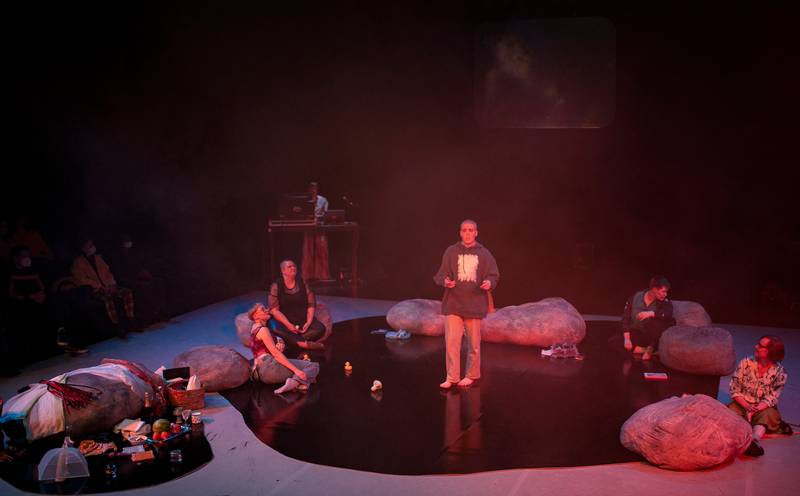

During the exchange from one of the questions to another, asked between the performers
‘What is your relation to pleasure’?: Another question from the performance got me thinking of saunas.
There are already many activist initiatives, but we must all do our “squirrels share”.
My current protests are focused on public sauna spaces in Finland. When I think of sauna, which is a ‘humongous’ part of the “suomen kulttuuri”, I get sad because these spaces of relaxation have become places of sexism from my personal experience. I’ll always think twice about inviting a friend to Finland and taking her on a tour of the local Helsinki saunas. I stopped going to some of these saunas entirely. We can get “käyttöoikeus merkki”10, a friend proposed. That’s what we did. However, we were unaware of how hostile sauna spaces become when the person with “käyttöoikeus merkki”, is a trans-femme-of-colour. This “merkki” works for the staff who understand what it means, but the general public reacts with aggression. As Minna Salami11 highlights in the performance, the dangers of traumatic narratives of black and brown ‘ideas’ that stick deep, historically. I am telling you, when trans-femme of colour enters a sauna space, everyone puts down their harry potters, and start rawling12.
Final words
We entered the post-performance Q&A. For the first time in my life in Finland, I encountered the true meaning of the word, Myötähäpeä13, when a person who identified as a cis-hetero-male, also white, inquired as to why the performance, Ejaculation Falls, didn’t have any male performers.
I met someone at the Ejaculation Falls performance who was processing that her mom was a lesbian. My heartfelt congratulations to Ejaculation Falls for enabling this kind of sharing. Ejaculation Falls definitely has this potential. I applaud the already amazing work. However, as a person of abundance, I’d like to see more. Encore. Indeed, an encore. I’m looking for more, so, these are my questions: do you intend to repeat this performance? Would you consider adding languages other than Finnish and English? What aspects of your performance would you keep and which would you eliminate? Will you make the videos you showed during the performance available to everyone with subtitles?
